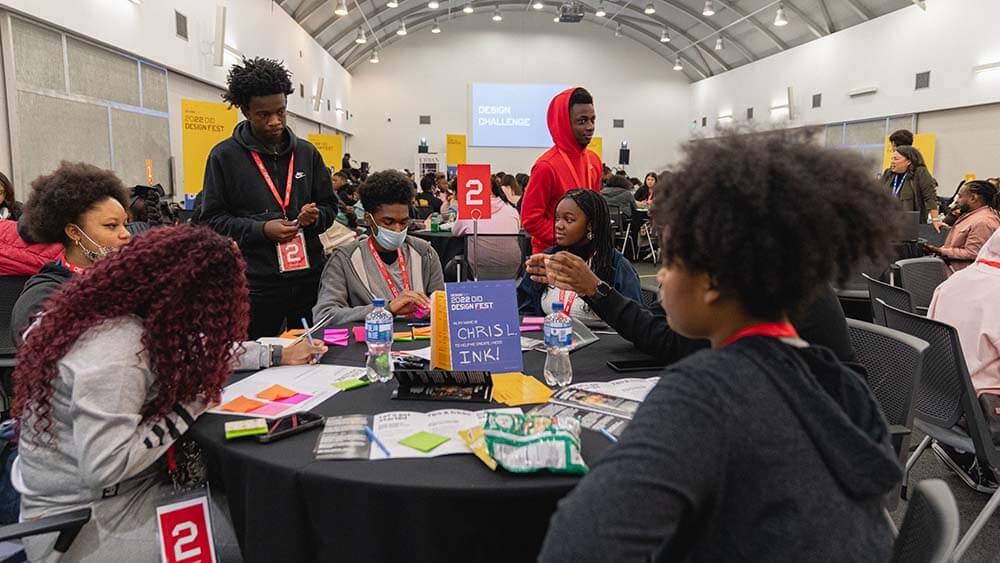
DID Collaborative companies work together to expose high school students to career options in the design industry, where less than 5 percent of designers are Black.
“The Future 100: 2023,” creative agency, consultancy, and technology company Wunderman Thompson’s annual forecast, identifies 100 trends across industries — from culture to technology to travel and hospitality — that will shape the way we live and work this year and beyond.
Convene’s editors each have chosen three trends from Wunderman Thompson’s latest report and connected them to meetings and events. Here are three that resonated with Digital Editor Curt Wagner.
Amplifying Diverse Creators
Anyone who watched the recent 95th Academy Awards telecast saw history being made as “Everything Everywhere All at Once” won seven Oscars, including Michelle Yeoh’s historic best actress win — the first-ever for an Asian actress and the first for a non-white actress in 20 years. In her acceptance speech, Yeoh said her win “is a beacon of hope and possibility” for “all the little boys and girls who look like me.” According to Wunderman Thompson’s report, consumers are demanding that kind of authentic representation in advertising, too, which is driving a wave of brand collaborations with creators, artists, and influencers from marginalized backgrounds.
The report highlighted the Diversity in Design (DID) Collaborative, a consortium of big-name brands that Convene Deputy Editor Barbara Palmer wrote about in 2022. Nineteen global companies — Adobe, Dropbox, and Fossil Group among them — signed on as cofounders of DID in June 2020 when the design company MillerKnoll launched it to address racial representation in the design industry, where fewer than 5 percent of designers are Black. Since its launch, DID has been holding networking experiences, design festivals, and other events where potential creatives who are in high school, college, and early in their careers get the chance to interact with design professionals from the founding brands and elsewhere.

Madison Butler
For Convene’s upcoming March/April issue, I wrote about a new training and mentorship program in the F&B sector of consumer packed goods called “(included) ACCESS” that helps minority-owned brands navigate trade shows, where meeting a retail buyer potentially can lead to distribution deals and success. The program’s first 10 participants recently exhibited at the Natural Products Expo West 2023 in Anaheim, California.
I can’t leave this trend without bringing up an elephant in the conference center, so to speak: Events that are “painfully short of any speakers outside of white men.” That’s how Madison Butler, founder of HR and DEI consultancy Blue Haired Unicorn and a keynote speaker at PCMA EduCon 2022, described the phenomenon she sees far too often at business events and conferences when she spoke with Convene Editor in Chief Michelle Russell in 2021. That’s one reason Butler launched the Black Speakers Collection, a now two-year-old website that showcases more than 3,000 Black speakers and advocates for them to get paid what they’re worth.
While Butler talked specifically about the speaker situation, her words hold true for any inclusivity efforts: “I encourage people to be really intentional and consistently ask, ‘Whose voice is not represented here? Who is not at the table and who does not see themselves in this panel or conference?’ Because representation is so incredibly important, and it matters so much.”

New social media apps are creating rituals that could end the days of scrolling, scrolling, scrolling.
Ritualistic Apps
If you’ve ever had a dinner companion or coffee buddy look at their cell phone to read yet another new post on a social-media app — or been guilty of doing the same —this trend is for you. Wunderman Thompson reports that new “ritualistic” social apps are encouraging once-a-day posting as opposed to addictive posting and scrolling and liking and commenting constantly throughout the day.
Besides demanding less of your attention, these new apps turn engagement into more rewarding experiences because the daily ritual builds anticipation and shows users more authenticity, app developers say.
According to the report, this refreshing approach to social-media engagement was sparked by French startup BeReal, which reached the top of the App Store’s social-media downloads in August 2022 in the U.S., U.K., and Australia. BeReal alerts its users at a random time every day to upload a composite picture made up of a capture from both their forward-facing and selfie cameras. They get only two minutes to do so. With this random approach, the app gets users to share a hopefully authentic look at that moment in their day. (I say “hopefully” because I know some people who could twist two minutes into an elaborate selfie pose.)
As Wunderman Thompson writes, the limited engagement provides “fun rituals that allow people to connect with others in more authentic ways.” Events are all about connection and encouraging attendees to show up as their authentic selves. Adding a similar function to an event app and a similar prompt at an event could introduce a new ritual that would encourage attendees to carve out a moment all at the same time for interaction with others. And continuing to use the prompts after an event could engage attendees with new education, membership information, or just plain fun.

As a pandemic past time and now side gig, Digital Editor Curt Wagner transforms photos he takes (left) into new designs (inset) that be uses on other products, like a comforter (right).
The Artisan Wave
In the first year of the COVID-19 crisis, Convene editors shared their pandemic pastimes — those fun or calming activities we were doing to keep our sanity during lockdown — to accompany a story about how hobbies help people deal with stress. The artisanal movement trend suggests a lot of folks have turned their hobbies into side gigs or, for some, careers.
According to Wunderman Thompson, experts are predicting the rise of a new artisan economy fueled by disillusioned workers who are dropping out of traditional jobs to become cheesemongers, bakers, brewers, jewelers, knife makers — creators of pretty much any hobby or handicraft you can think of.
So that’s where all those “great resignation” workers went? Maybe. Are the “quiet quitters” spending more time on their side gigs than their real jobs? Possibly. In a recent article in The Guardian, anthropologist Grant McCracken, author of the 2022 book Return of the Artisan, said two out of every three new jobs in America are driven by the artisanal movement. “I think we can take that as a measure of which people are relatively unhappy with their present circumstances,” McCracken said.
The great resignation affected many industries, but the meetings and hospitality sectors were hit especially hard, Convene reported in its August 2022 cover story, “Hire Education.” People were laid off or furloughed, retired, or simply quit — and those who were left still are dealing with heavier workloads and understaffed partners and vendors.
In an interview on PBS’ “Firing Line” last fall, organizational psychologist and author Adam Grant, a PCMA Convening Leaders 2023 keynote speaker, suggested workplaces are waking up to the idea that they need to provide a good quality of life in order to retain employees. As myriad career stories we share in our News Junkie and Career Center newsletters say, some companies are experimenting with hybrid and remote work options, non-linear work hours, more accommodations at the office, and other innovations to provide a better work life for employees.
Meanwhile, there are plenty of ways for events to embrace the artisanal movement — like including fresh farm-to-table offerings in event meals provided by small farms, visiting an artist collective for a memorable off-site experience, and hiring local craftspeople to offer their artistic expertise on a neighborhood beautification project for a CSR initiative or a DIY crafting experience as a teambuilding project.
Curt Wagner is digital editor at Convene.
